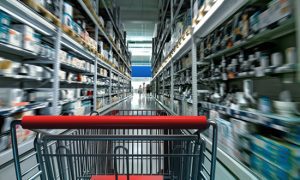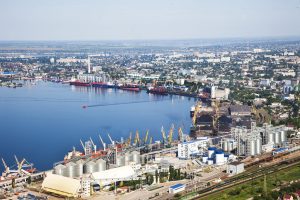
National Nuclear Generating Company Energoatom plans to increase the annual volume of electricity production to 95 billion kWh in two or three years, while the expected volume of electricity generation this year is 78 billion kWh, acting President of Energoatom Petro Kotin said at the forum Ukraine30 on Wednesday.
“We know how to do this, and we have big plans for the future, and if now we plan to generate 75 billion kWh in accordance with the energy balance, or maybe 78 billion, then our goal is to reach production of 95 billion kWh per year,” he said.
According to the head of the company, the company has planned a repair campaign for the next two to three years so that no more than two or three units will be under repair in winter.
As Deputy Energy Minister Yuriy Boiko said at the forum, during the preparation of the energy balance forecast for the current 2021, during discussions between NPC Ukrenergo, profile specialists of the Energy Ministry and Energoatom, by optimizing the repair site of Energoatom, it was possible to increase the additional generation of nuclear power plants (NPP) in the annual balance by 3 billion kWh.
“I think that this is a good indicator. Moreover, today there are preconditions that this figure will increase,” Boiko said, recalling the launch of Khmelnytsky NPP power unit No. 2 after the scheduled repair a month earlier than the planned date.
At the same time, the deputy minister said, three months of this year will be problematic for Energoatom – from August to October – during which the energy system will not be able to encompass all the electricity produced by Energoatom.
“In order to maximize the production of Energoatom, a number of measures should be taken. First of all, it is necessary to optimize the repair site so that repairs are not carried out in the cold season, but shifted to the summer. The next step is to optimize the repairs, namely those of them, which take place in the cold season,” Boiko said.
According to the Deputy Energy Minister, the construction of electrical installations for the production of hydrogen, the creation of data centers on the basis of NPP sites, the construction of flexible generating capacities, as well as the completion of power units No. 3-4 of Khmelnytsky NPP and No. 5 of Rivne NPP are among the long-term measures that will maximize the production of nuclear power.

The Consumer Confidence Index (CCI) equals 60.7 (the values of indices can vary from 0 to 200) in January, which is 5.2 points lower than in December 2020, according to a study of Info Sapiens.
“The consumer confidence index in January 2021 reached its lowest level since April 2019. Thus, the index returned to the level as in early 2019, before it began to grow due to the presidential elections,” Info Sapiens said in a report on Tuesday.
According to the study, Index of the Current Situation (ICS) equals 57.4 which is 3.4 p. lower than previous month. The components of this index have changed as follows: Index of Current Personal Financial Standing equals 48.2, which is 5.1 points lower than the indicator in December; and Index of Propensity to Consume decreased slightly to 66.6.
In January, Index of Economic Expectations (ІЕE) decreased by 6.4 points and equals 62.9. The components of this index have changed as follows: Index of Expected Changes in Personal Financial Standing equals 68.6 which is 7.8 points lower that the level of this indicator in December; Index of Expectations of the Country’s Economic Development Over the Next Year decreased by 5.8 points and equals 49.2; and Index of Expectations of the Country’s Economic Development over the Next 5 Years decreased by 5.7 points compared to last month and equals 70.8.
Info Sapiens said that in January, the indicator of Index of Expectations of Changes in Unemployment slightly increased to the level of 147.2. Index of Inflationary Expectations increased by 3.2 points and reached the level 189.9.
Expectations of Ukrainians regarding the hryvna’s exchange rate in the coming three months remain stable: Index of Devaluation Expectations equals 148.7.

Mykolaiv seaport in January 2021 reduced transshipment of goods by 24% compared to January 2020, to 1.99 million tonnes.
According to the website of the Ukrainian Sea Ports Authority, in January the port reduced transshipment of export cargo by 30.6%, to 1.391 million tonnes, increased transshipment of imported cargo by 0.1%, to 516,760 tonnes, transshipment of transit goods by 0.3%, to 28,300 tonnes.
At the same time, the seaport handled 54,320 tonnes of cabotage cargo, a decrease of 21.2% compared to January 2020.
Transshipment of liquid cargo in Mykolaiv seaport in January increased by 29.1%, to 285,400 tonnes, dry bulk cargo decreased by 30.6%, to 1.434 million tonnes, packaged goods decreased by 18.4%, to 270,880 tonnes.
Mykolaiv seaport is located on an area of 97.3 hectares and a water area of 224.5 hectares.
The port has 15 berths with a total length of 2,962 meters.

The mobile operator Kyivstar has analyzed the popularity of messengers, social networks and platforms among Ukrainians.
According to the company’s report, the study used generalized and anonymized data on mobile data traffic in the operator’s network.
According to the operator, Viber is the most popular messenger among Kyivstar subscribers – 12 million subscribers of the operator use it monthly. Next in the ranking are Facebook Messenger with 11 million users, Telegram with 6 million and WhatsApp with about 5 million.
“The most popular social platforms are Facebook and YouTube, they are monthly used by about 13 million Kyivstar subscribers. Instagram is used by 10 million people. Unexpectedly, Twitter ranks third with 7 million, and TikTok closes the list of leaders with 5.5 million,” Kyivstar said.
According to the report, on average, the operator’s subscribers spend the most time on TikTok – 88 minutes a day. And every tenth user spends more than 4 hours a day in this application.
YouTube is watched an average of 54 minutes a day, and 44 minutes is spent on Facebook.
Kyivstar subscribers actively use social networks in the evening, from 18:00 to 22:00, as well as in the afternoon, from 12:00 to 13:00.
Expectedly, the largest amount of mobile Internet per month is used when watching YouTube – an average of 2.5 GB per subscriber, TikTok ranks second place with 0.6 GB, and Instagram – 0.4 GB.
Foreign direct investment in Ukraine as of 09/30/2020 (balance, $ MLN).

NBU

The findings of the Supreme Court, which allowed Tedis Ukraine to satisfy the cassation appeal against the Antimonopoly Committee of Ukraine (AMCU) and invalidate the fine of UAH 3.4 billion, will also significantly enhance the prospects of cigarette manufacturers to revoke the decision of the committee on fines, according to lawyers interviewed by Interfax-Ukraine.
“Speaking of other tobacco trials, it should be said that the Supreme Court’s findings on the inconsistency of the Antimonopoly Committee’s decision with the rules of prejudice and evidence can significantly enhance the prospects of cigarette manufacturers to overturn the Antimonopoly Committee’s decision,” Asters law firm partner Oleksiy Pustovit said.
He recalled that the Supreme Court had put an end to the Tedis Ukraine lawsuit against the Antimonopoly Committee, invalidating the committee’s decision incriminating anti-competitive concerted actions by Tedis and cigarette manufacturers Philip Morris International (PMI), JT International (JTI), Imperial Tobacco (IT) and British American Tobacco (BAT).
“The decision is important both in terms of influencing the law enforcement practice of the Antimonopoly Committee as a whole and in terms of changing the balance of power in ongoing similar litigation between cigarette manufacturers and the committee,” he said.
The lawyer called the Supreme Court’s decision “brief and capacious at the same time.” In particular, according to the lawyer, the most remarkable position is the illegality of the committee’s use of its decisions and recommendations in other cases as adjudicated. Many of the committee’s findings were not established or examined on the basis of evidence, as required by law, but were taken from other cases in which participants, markets and circumstances differed. In addition, the committee’s decision also contained elements of letters of recommendation as evidence in the case, which was closed without establishing any facts of violation of competition law.
“The Supreme Court concluded that the Antimonopoly Committee, citing other decisions, did not in fact investigate the market itself, which is decisive for any antitrust case, while other decisions dealt with other markets. The issue of the illegality of the committee’s use of its decisions in other cases as adjudicated was raised by the manufacturers and Tedis at the stage of consideration of the case by the committee. From a legal point of view, such an approach is tantamount to charges without some hard evidence,” he said.
The lawyer said that similar arguments were used in the claims of the tobacco manufacturers.
“Following the decision of the Supreme Court, courts will most likely follow the position of the illegality of the committee’s decisions and recommendations made in other cases as adjudicated, in other cases under manufacturer’s claims, which enhances the manufacturer’s chances of winning disputes with the committee,” Pustovit said.
In turn, partner of the Legal Alliance Andriy Gorbatenko reminded that the Antimonopoly Committee imposed a fine on tobacco companies due to the fact that with the entry of Tedis Ukraine (formerly Megapolis-Ukraine) in 2010, the number of cigarette distributors began to decline sharply and by 2013 Tedis Ukraine was the only distributor to which cigarette manufacturers supplied their products. Following the investigation, the committee concluded that this circumstance was the result of anti-competitive concerted actions that concerned the elimination of other distributors from the market or restriction of market access to them. In particular, the Antimonopoly Committee found that cigarette manufacturers had identified unfeasible selection conditions for distributors, which even Tedis Ukraine did not meet.
However, the lawyer said that “the unfortunate decision of the Antimonopoly Committee does not contain exhaustive evidence that would unequivocally answer this question,” and the Antimonopoly Committee did not provide evidence of consistency between the actions of cigarette manufacturers and Tedis Ukraine.
“Could this decision of the Supreme Court be the basis for reversing the decision of the Antimonopoly Committee and some cigarette manufacturers? Definitely, yes. Given the position set out in the decision of the Supreme Court, the accusation of the Antimonopoly Committee in this case is as follows: there seemed to be some agreement to establish barriers for other distributors to enter the primary cigarettes market, but it is not clear who agreed on this and with whom and it does not mean that the conditions established as a result of such an agreement (if any) could really create a barrier,” the lawyer said.
Gorbatenko also said that “the rest of the charges are based on evidence that cannot be used because it was collected in other investigations.”
“The probability that the Antimonopoly Committee’s decision regarding the accusations against the manufacturers will be backed by courts is akin to the probability of meeting an alien mind. Of course, there is a chance, but everyone will be very surprised if it really happens,” the lawyer said.
“We just have to hope that this decision of the Supreme Court will not only bring disappointment to the Antimonopoly Committee, but will also be an incentive for more thorough investigations and preparation of decisions, possibly in relation to Tedis Ukraine,” Gorbatenko said.
In turn, the American Chamber of Commerce in Ukraine reminded that “the rule of law and fair justice is one of the strategic priorities identified by the American Chamber of Commerce in 10 steps for Ukraine’s economic recovery and growth in 2021.”
The Chamber, in particular, notes the need for transparent and fair litigation, as companies have expressed concern that they have not been given full access to the evidence on which the Antimonopoly Committee’s allegations are based, and that insufficient attention was paid the companies’ arguments during the trial.
“Such high-profile disputes usually attract a lot of attention from the international community and can have an extremely negative impact on Ukraine’s image among foreign investors. A quick, transparent and fair solution will help maintain business relations between strategic investors and the state, not damage Ukraine’s reputation and investment climate and avoid losses for the budget,” President of the American Chamber of Commerce in Ukraine Andy Hunder said.